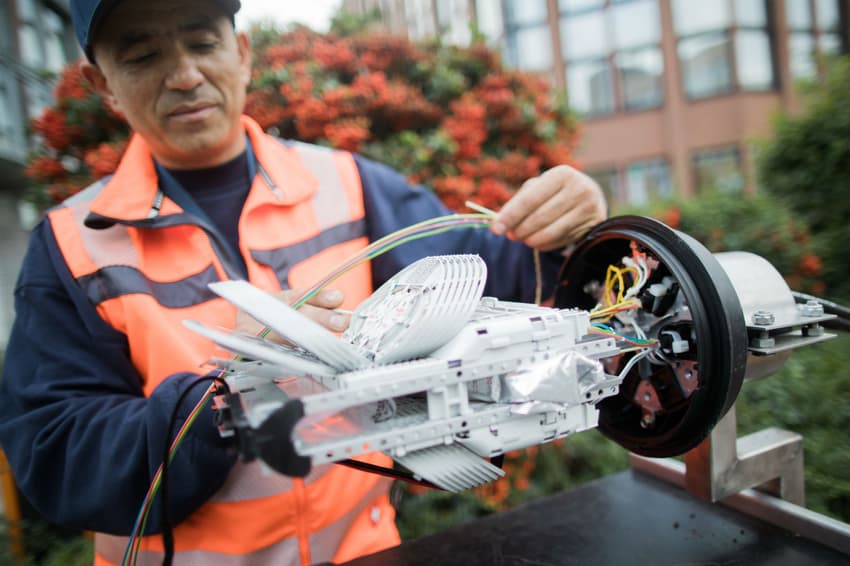Germany's slow internet: only fraction of government funding has been spent

The government seemed ready to spend money on improving Germany's slow internet. But only a fraction of the €3.5 billion set aside for improvements to broadband connections has been spent.
So far German cities and counties have only spent a fraction of the federal funds set aside for building faster internet. Since 2015, the federal government has set aside €3.5 billion for internet projects, according to the Ministry of Transport and Infrastructure's response to a query by the Green party. But by the end of May only €26.6 million had been spent - or 0.8 per cent.
"Most of the funds are expected to be spent by the end of 2021," the ministry claimed.
But the Green party has accused former Transport & Infrastructure Minister Alexander Dobrindt of the conservative Christian Social Union (CSU) of creating a labyrinthine application process for the funds which has bottle-necked access.
"He made the programme so complicated that smaller states and municipalities are understandably overwhelmed with the applications", says Green politician Oliver Krischer.
"The grants for broadband internet are stuck at the starting line", added Green MP Margit Stumpp.
The large majority of the funds spent so far (€23.4 million) have actually financed consultations and discussions rather than infrastructure projects. Most municipalities haven't gotten beyond the first stage of consultations.
Up to this point, only two of the projects agreed as part of a 2015 broadband expansion plan have been fully completed, though the ministry says several projects are underway.
The Christian Democratic Union (CDU), the CSU, and the Social Democratic Party (SPD) announced in their 2018 coalition agreement that they would make it easier for local governments to access federal funds for digital development. Proposals to do so are already on the table, the Transport Ministry said.
While the organisation representing German municipalities claims there are good reasons for the delays, several German states have criticized the federal government for the complexity of the process.
Compared to the rest of the EU, Germany's internet speeds are mediocre. Critics such as the European Court of Auditors take objection not just to the slow speeds but also to the type of cables used. The controversy is about the practice of "vectoring", whereby the performance of old copper cables is improved. This process enables speeds of 50 to 100 Megabits per second, and is cheaper than laying new fibre-optic cables. But modifying the old infrastructure, rather than laying new cables, makes it more difficult for connection speeds to increase as technology improves.
FOR MEMBERS: How Germany plans to zoom out of the digital slow lane (and why it could struggle)
Comments (1)
See Also
So far German cities and counties have only spent a fraction of the federal funds set aside for building faster internet. Since 2015, the federal government has set aside €3.5 billion for internet projects, according to the Ministry of Transport and Infrastructure's response to a query by the Green party. But by the end of May only €26.6 million had been spent - or 0.8 per cent.
"Most of the funds are expected to be spent by the end of 2021," the ministry claimed.
But the Green party has accused former Transport & Infrastructure Minister Alexander Dobrindt of the conservative Christian Social Union (CSU) of creating a labyrinthine application process for the funds which has bottle-necked access.
"He made the programme so complicated that smaller states and municipalities are understandably overwhelmed with the applications", says Green politician Oliver Krischer.
"The grants for broadband internet are stuck at the starting line", added Green MP Margit Stumpp.
The large majority of the funds spent so far (€23.4 million) have actually financed consultations and discussions rather than infrastructure projects. Most municipalities haven't gotten beyond the first stage of consultations.
Up to this point, only two of the projects agreed as part of a 2015 broadband expansion plan have been fully completed, though the ministry says several projects are underway.
The Christian Democratic Union (CDU), the CSU, and the Social Democratic Party (SPD) announced in their 2018 coalition agreement that they would make it easier for local governments to access federal funds for digital development. Proposals to do so are already on the table, the Transport Ministry said.
While the organisation representing German municipalities claims there are good reasons for the delays, several German states have criticized the federal government for the complexity of the process.
Compared to the rest of the EU, Germany's internet speeds are mediocre. Critics such as the European Court of Auditors take objection not just to the slow speeds but also to the type of cables used. The controversy is about the practice of "vectoring", whereby the performance of old copper cables is improved. This process enables speeds of 50 to 100 Megabits per second, and is cheaper than laying new fibre-optic cables. But modifying the old infrastructure, rather than laying new cables, makes it more difficult for connection speeds to increase as technology improves.
FOR MEMBERS: How Germany plans to zoom out of the digital slow lane (and why it could struggle)
Join the conversation in our comments section below. Share your own views and experience and if you have a question or suggestion for our journalists then email us at [email protected].
Please keep comments civil, constructive and on topic – and make sure to read our terms of use before getting involved.
Please log in here to leave a comment.